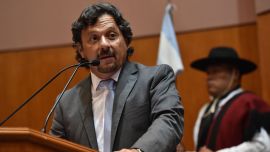ECONOMY PRESIDENT’S REACTION
‘Not a millimetre’: Milei vows no shift in policy after IMF support
Following damaging electoral defeat and resulting market jitters, President insists his economic reform plan will continue unchanged.
President Javier Milei has vowed to stay the course with his economic programme, despite a damaging defeat in last week’s elections in Buenos Aires Province.
In a post on social media on Tuesday, the La Libertad Avanza leader said his plan for Argentina's struggling economy remained unchanged and would not be shifted even by “a millimetre," despite the loss and subsequent market jitters.
Last weekend, Milei’s government lost key local legislative elections in Buenos Aires Province, the opposition Peronist stronghold that represents 40 percent of Argentina's electorate.
La Libertad Avanza won 33.7 percent of the vote in the region, some way behind the opposition Peronist alliance, Fuerza Patria, which secured a commanding 47.2 percent.
The defeat comes just weeks before national midterm elections on October 26, in which Milei will seek to boost his party’s representation in Congress.
“Just as I stated on Sunday, we will not shift our economic programme by even a millimetre,” Milei posted on X.
The president underscored ongoing support from the International Monetary Fund (IMF), quoting a message from the organisation in support of Argentina’s monetary and exchange-rate stability plans, fiscal discipline and deregulation agenda.
“IMF staff is closely engaged with the Argentine authorities as they implement their programme for entrenching stability and improving the country’s growth prospects,” said IMF spokesperson Julie Kozack in a post on X.
“We support their commitment to ensure the sustainability of the programme’s FX and monetary framework, as well as their continued adherence to the fiscal anchor and comprehensive deregulation agenda,” added the official.
Milei outlined the pillars of his plan: fiscal balance, strict limits on money-printing and adherence to an exchange-rate band agreed with the IMF.
That system, part of a US$20-billion programme with the multilateral lender signed in April (of which US$14 billion has already been disbursed), restricts government intervention in the currency market unless the dollar trades outside the range of 975 to 1,470 pesos. The range adjusts monthly by one percent through micro-devaluations.
Economy Minister Luis Caputo also reinforced the message. “We will not deviate one iota from the economic programme,” said the official on X.
The Milei administration has spent much of the week grappling with the economic fall-out of last weekend’s defeat.
On Monday, some Argentine shares listed on Wall Street plunged by as much as 15 percent, while the Buenos Aires Stock Exchange fell 13 percent.
Meanwhile, the dollar surged towards the upper end of the currency band, stabilising at 1,425 pesos at Banco Nación on both Monday and Tuesday – a rise of 3.26 percent compared to Friday.
Last week, the Milei government shifted policy to intervene pre-emptively in the foreign exchange market to curb the dollar’s rise, even though it had not breached the upper limit of the floating band.
The President is facing heavy political pressure amid a developing scandal over alleged corruption at the ANDIS national disability agency.
Leaked audio recordings quoting the body’s former chief implicate the president’s sister, Karina Milei, in an alleged bribery scheme involving the public procurement of medicine and services for the disabled.
Karina, who serves as the President’s chief-of-staff, is the head of state’s closest confidant.
A criminal investigation into the recordings, which has yet to verify their veracity, is ongoing.
On Monday, the ruling party announced the creation of a "national political committee" and called for dialogue with Argentina’s powerful provincial governors.
– TIMES/AFP/NA
























Comments